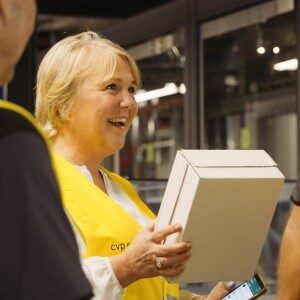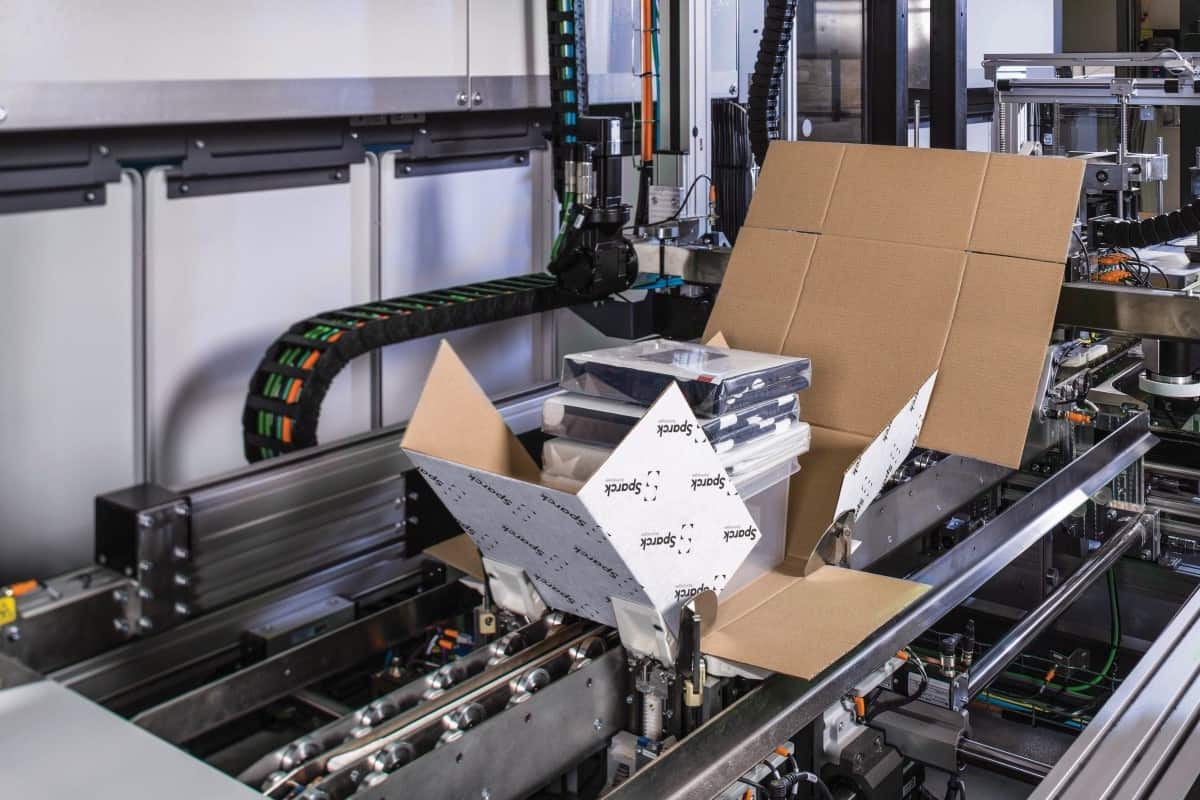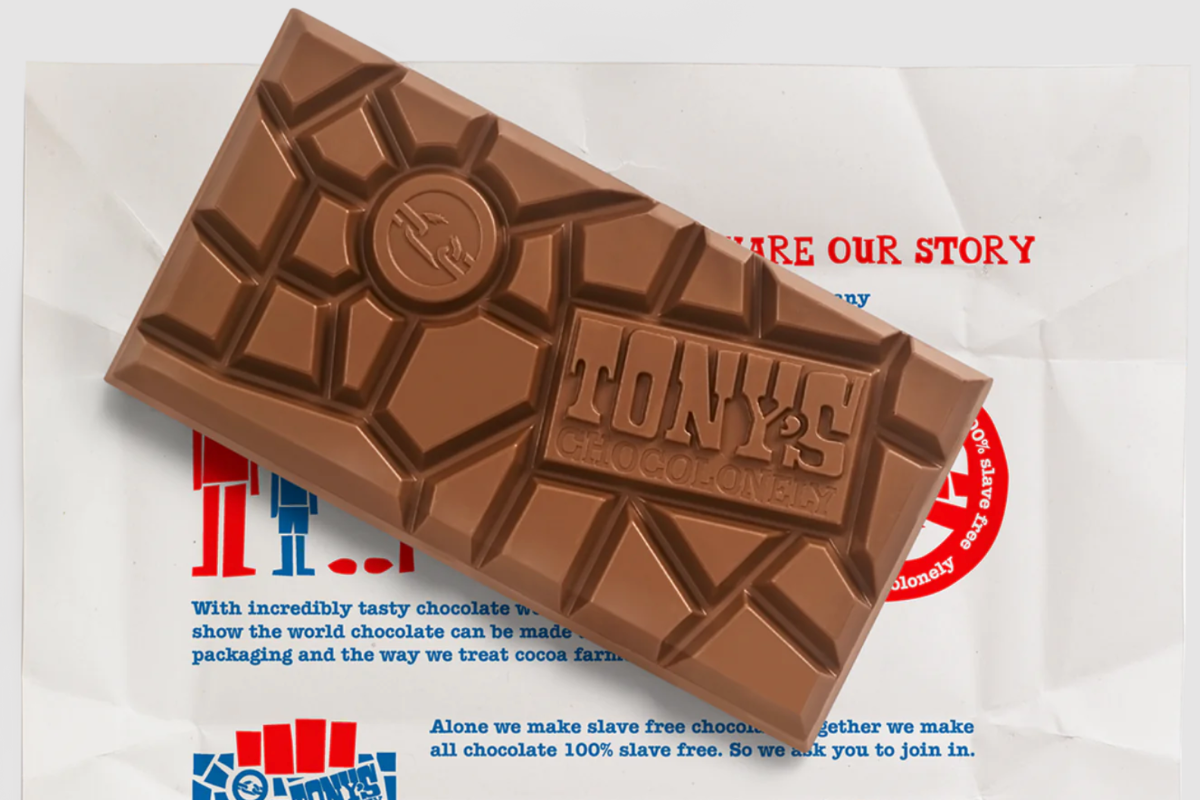| Founded: 1924, as HaDaWe Headquarters: Drachten, Netherlands No of Employees: 300+ Customers: among others Boots, Asda and The White Company Website: https://www.sparcktechnologies.com |

“We believe that every individual, precision-made package produced by our machines should be a brand ambassador for the business.”
Jo Bradley, business development manager, Sparck Technologies

What does your company do – what is your USP?
Most people in the logistics and efulfilment sector will be familiar with Sparck Technologies’ revolutionary fit-to-size packaging systems. Our CVP Everest and CVP Impack automated packaging solutions can 3D scan multiple or single item orders, and tailor-make up to 1,100 packages an hour.
We design, build and develop automated solutions for ecommerce operations that are challenged by increasing order volumes, labour shortages and rising shipping costs. Our CVP Automated Packaging Solutions – installed in more than 13 countries – effortlessly create, fill, fold and label each parcel in one seamless process, reducing package volumes by up to 50%, cutting cardboard usage by 30% and eliminating the need for void fill.
What retailer need do you fulfil?
The ecommerce sector has experienced phenomenal growth in recent years and peak seasons are becoming more pronounced and more frequent. Capacity issues in despatch operations are becoming increasingly acute as volumes rise and labour resources become harder to come by – and adding to the concerns businesses face, consumers are now far more conscious of environmentally-poor packaging and oversized boxes filled with void-fill.
Retail businesses have a responsibility to make packaging as compact and environmentally efficient as possible and that means making packages exactly the size of the order – waste is no longer acceptable to the consumer. And we can help retailers meet those responsibilities by supplying advanced systems that build right-sized packages for each ecommerce order with great speed and precision.
How do you deliver on this USP?
By building the optimum-size parcel around items in an order using corrugated packaging, the technology can reduce the total volume of each box used by up to 50%. This minimises shipping costs throughout the fulfilment process by filling trailer space, saving significant fuel costs and CO2 emissions. As a result, some ecommerce businesses have been able to remove up to one trailer a day from their distribution operation.
Boosting packaging capacity at peak is another USP of our machines. Two of the UK’s largest retail brands have invested in Sparck Technologies’ CVP solutions with the primary purpose of increasing capacity in their ecommerce operations during critical peak periods – building in operational resilience.
With the capability to tailor-make up to 1,100 packages per hour, for multiple or single item orders, the CVP Everest and CVP Impack packaging systems typically replace between eight and 20 manual packaging stations.
Customers have reduced the volumes they ship by anything up to 50%. Potentially, that could translate into halving fuel costs – the principal variable element of home delivery.
How would you describe your vision?
As an organisation, Sparck Technologies sees itself as an active evangelist for the advancement of eco-friendly packaging within the ecommerce sector. Our work, raising industry awareness as to the wasteful practice of using oversized boxes for ecommerce deliveries, has helped establish automated right-sized packaging as an accepted and transformative technology for the retail industry.
Which retailers do you work with?
Sparck Technologies’ machines are in use at some of the UK’s largest retailers – including Asda, The White Company, and Boots.
By pushing the boundaries of packaging performance, our fit-to-size packaging solutions are being taken up by a growing number of leading retailers for fulfilling online orders. One of the latest is The White Company, which is using Sparck Technologies’ CVP Everest to tailor-make more than 1,100 ecommerce packages an hour.
What challenges are you addressing for multichannel retailers who aim to meet peak season demands?
Packing orders over a seasonal peak has always been a challenge for businesses – even more so this year with acute labour shortages, elevated wages, and a national scarcity of warehouse space in which to accommodate peak activity. Not to mention the rising price of packaging materials.
Automation is the answer, but faced with the infinite variety of sizes, shapes and weights that make up a typical consumer order, this has often been seen as too complex and expensive an investment for something that is only crucial for a few months of the year.
That is really no longer the case. Automated ‘right-sized’ packaging for each individual ecommerce order is now readily available to small-to-medium sized enterprises, as well as larger ecommerce businesses.
CVP Automated Packaging Solutions from Sparck Technologies create ‘right-sized’ boxes in seconds by scanning and measuring the goods – single or multi-item orders – cutting to size and erecting the box, sealing, weighing, and labelling automatically.
How are you using the emerging technology to support retail growth?
Our technology helps ecommerce businesses expand by providing the means to boost packing capacity at peak without the need to increase labour resources.
What do you see as challenges for the retailers and suppliers over the coming years? How are you prepared to meet those challenges?
With labour now a scarce resource in the UK, businesses will need to invest in and embrace automation to keep pace with customer demand. Packaging and despatch operations within the ecommerce sector have been heavily dependent upon freely available labour, but now automation that is able to streamline packaging processes by making individual packages to the optimum size of the order, at tremendous speed, holds the key to increased capacity and business growth.
With inflation on the rise businesses will need to focus on controlling costs. Labour, fuel and materials will all become more expensive. Environmental concerns will continue to feature highly with consumers, so businesses will have to look for ways to minimise wastefulness – that means preventing the use of oversized packaging. Finding available labour will be difficult too, so businesses should apply automation to labour intensive operations, such as packing.
As leaders in advanced fit-to-size packaging technology, we wish to demonstrate to businesses the huge advantages that come from our technology
CASE STUDY Asda / Clipper Logistics
High speed e-fulfilment
Fit-to-size packaging saves cardboard and boosts sustainability for Asda
George Home has grown rapidly since it was launched in 2014, supported by strong ecommerce sales through George.com. Customer service is a core focus for the business, which is owned by leading UK supermarket brand Asda, and this extends to the fulfilment operation, where logistics services provider Clipper Logistics packs as many as 31,000 general merchandise items a day at peak.
Andrew Coffey, senior manager for engineering development and innovation for Asda Logistics Services, says: “We wanted to move towards a right-size packaging solution as we saw huge benefits from reducing the amount of card we used, as well as getting more parcels on a trailer through building smaller boxes.”
In 2019 Asda installed a CVP Impack from Sparck Technologies, which can tailor-make individual cardboard packages to the exact size of the items ordered at the rate of 500 packages an hour. Since then, Asda has been able to remove one 40ft trailer a day from the road. The business is now expecting to buy around 30% less cardboard for the same volume of packages produced by the pre-existing system. Pressure on labour resources during peak periods has also reduced, allowing for future growth.
There are important advantages to Asda customers too. Some 65% of ecommerce orders are for click & collect from an Asda store. Now customers receive a compact, right-sized box, which is more convenient to carry, eliminates ‘consumer distress’ over wasteful packaging and delivers a positive environmental message. At Asda pick up points, smaller packages save on storage space too.
Asda’s Andrew Coffey adds: “By building a box that fits securely around an item we would also expect to reduce transit damage and breakages.”
The performance of the CVP Impack has exceeded expectations for both Asda and Clipper Logistics. “It took us through our 2019 peak with very few issues,” says Coffey. “Uptime and performance was great and on ROI it has outperformed our projections. It has hit just about every metric we set for it. Saving one vehicle a day was over and above what was stated in our business case – we’re very pleased with how it’s performing.”
Graham Thornley of Clipper Logistics concurs: “I’m delighted with it. We’re planning on pushing around one million units through the machine during 2020.”
He adds: “It has given us the opportunity to reduce the congestion that we had previously around the existing automation and has given us all sorts of benefits, both from a cost and process point of view – I’m a great advocate of it.”






